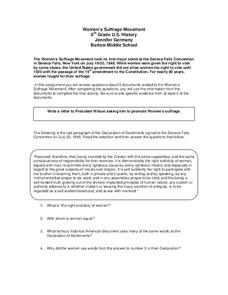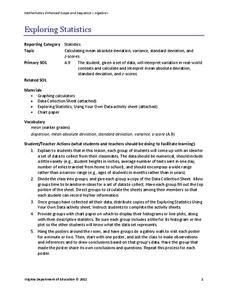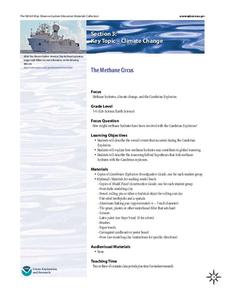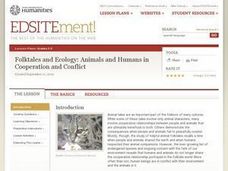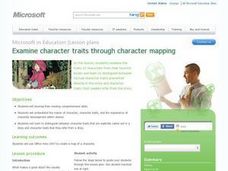Houghton Mifflin Harcourt
Songwriting Skill - Choosing a Tone: Jordan Pruitt - “One Love”
"Tone means attitude." Or so says this resource that uses Jordan Pruitt's "One Love" to model for songwriters how to develop an attitude in their lyrics. Class members engage in a number of exercises designed to give them direct and...
Curated OER
Women’s Suffrage Movement
Though the movement for Women's Suffrage stretched over several decades and across two centuries, the final few years were the most difficult hurdle in many ways. Use a document-based question writing exercise to make inferences about...
Illustrative Mathematics
Election Poll, Variation 1
Your class will learn what it means to take a random sample of a population and to draw inferences from the information gained. In part a, of the exercise, you discuss with your class how students during a class election can be best...
Read Works
Fireflies
A short story about a nighttime adventure at summer camp provides readers with a chance to practice their comprehension skills.
Virginia Department of Education
Exploring Statistics
Collect and analyze data to find out something interesting about classmates. Groups devise a statistical question and collect data from their group members. Individuals then create a display of their data and calculate descriptive...
EngageNY
Analyzing Character: Louie Zamperini
Let's talk! Scholars create discussion appointments using map locations. After completing their appointment books, readers look closely at a few Unbroken pages. They use sentence strips to record details from their readings that help...
NOAA
The Methane Circus
Step right up! An engaging research-centered lesson, the third in a series of six, has young archaeologists study the amazing animals of the Cambrian explosion. Working in groups, they profile a breathtaking and odd creature and learn...
Curated OER
Get the Joke!
Middle schoolers explore humor through word context and inference used in everyday language.
Curated OER
Asha's Village
Students compare and contrast their own culture with an Indian girl named Asha. In this culture lesson plan, students read, look at pictures, and make inferences.
Curated OER
What Are We Reading for Again?
Students work to develop comprehension strategies. Through modeling and guided practice they develop a series of questions as they read Where the Wild Things Are. They apply these questions to find answers about the text and make...
Curated OER
African Folktales Lesson
Students explore what a folktale consists of as it relates to oral tradition. In this folktale lesson, students are told the African folktale, Why the Sun is Lives in the Sky and make personal inferences about what the folktale is...
Curated OER
Archeology: Weapons of the Texanos
Students develop archaeological context skills through a simulation which places them in the year 2500. After listening to the teacher read, "Weapons of the Texanos," they record what they think the weapon is. Next, in groups, they...
Curated OER
What's the Best Deal?
Students explore number sense by solving consumer math problems. In this pattern identification activity, students analyze a list of numerical and geometric patterns while predicting the future outcome. Students utilize inference skills...
Curated OER
Folktales and Ecology: Animals and Humans in Cooperation and Conflict
Story elements such as conflict, character analysis, resolution, and moral are discussed and charted as elementary children read folktales involving animals. An element of science is also introduced as learners discover what a keystone...
Curated OER
Examining Character Traits through Character Mapping
Some of what we know about a character is directly stated. Some of what we know is inferred by events in the story. Character maps help primary learners recognize the difference. After modeling with a story your class has read, pupils...
Curated OER
Process Skills Review: Observation, Inference, and Predictions
A simple worksheet asks science learners to define five terms and identify five statements as predictions, observations, or inferences. This would be a supportive assignment when introducing elementary-levle scientist to inquiry practices.
Curated OER
Reading About the Journey: The Odyssey
Students practice their reading skills. In this reading fluency and comprehension instructional activity, students read instructor-selected passages from The Odyssey following the provided steps for the reading class activity that...
Curated OER
Amazon Adventure: A Case Study in Medical Technology and Bioethics
Young scholars explore a case study. They use problem solving skills to determine initial procedures or experiments necessary slow disease and develop a drug. Students examine FDA drug approval procedures. They consider environmental...
Curated OER
Organizing Data Using Tables and Graphs
Learners create graphs and tables, as well as interpret and make inferences from the data shown to determine when and where graphs and tables are most useful.
Curated OER
Literature-based Skill Building: Holes by Louis Sachar
For this reading skills worksheet, learners complete several literature-based skill building activities for the book 'Holes' by Louis Sachar.
EngageNY
Launching the Module: Quotes about the Middle Ages
Pick a corner. Scholars receive a quote about the Middle Ages and then participate in a four corners activity by choosing a corner pertaining to their quotes. They then work in groups of three to discuss the bold words in their quotes....
California Education Partners
Frog and Toad Together by Arnold Lobel
A three-part assessment tests scholars' reading and writing capabilities. Young readers listen to and read an excerpt from Frog and Toad Together by Arnold Lobel. After drawing pictures of what is memorable, learners discuss...
California Education Partners
Covers by Nikki Giovanni
Over three days, scholars listen to and read the poem, "Covers" by Nikki Giovanni. Learners complete a graphic organizer by sketching their visualizations from each stanza then discuss their pictures with a peer. Pupils answer...
Curated OER
Memories to Last: Observing Monuments
Students use scientific observation and inference to examine the Hazen Brigade Monument. In this observation lesson, students review the reasons for building monuments in society. Students then recall monuments they have seen and...
Other popular searches
- Teaching Inference Skills
- Inference Skills First Grade
- Reading Inference Skills
- Powerpoint Inference Skills
- Inference Skills in Reading
- Inference Skills Worksheet
- Science Inference Skills
- Inference Skills Sixth Grade

